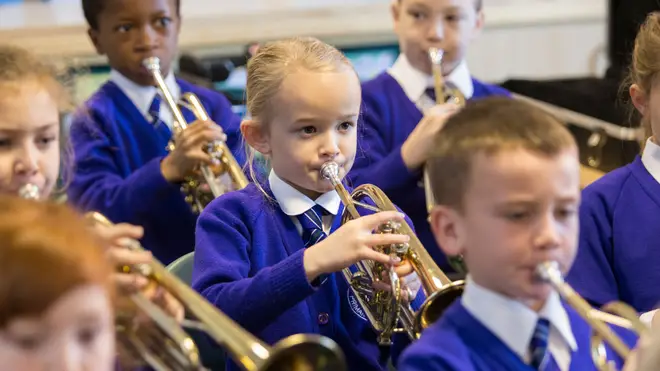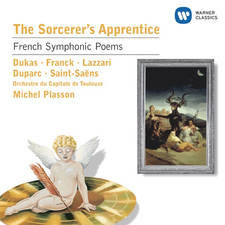Schools should offer at least ‘one hour of music a week’ – new music education plan revealed
27 June 2022, 13:29 | Updated: 31 January 2023, 14:09

The refreshed national plan for music education sets out the government’s ambition to “level up musical opportunities for all children, regardless of circumstance, needs or geography”.
The UK government’s Department for Education has published its new national plan for music education in England, postponed by two years due to the coronavirus pandemic.
The plan has been made in consultation with music teachers, young people in music education, and beyond, over 5,000 of whom responded to the government’s call for evidence to inform proposals for a refreshed national plan. When the responses were published in 2021, the Incorporated Society of Musicians (ISM) said the findings made for “sobering reading”.
In the new, 88-page ‘The Power of Music to Change Lives’, new investments have been announced to help champion music education.
£25 million in new funding will be made available to help schools purchase musical instruments and equipment. This includes adapted instruments for pupils with special educational needs and disabilities.
Schools will also be asked to offer “at least one hour of music curriculum” a week, and outside of school time, a commitment of a further £79 million has been made by the plan, every year until 2025, for the Music Hubs programme.
Since its publication on Saturday 25 June, many national music organisations have come forward to share their positive first thoughts on the highly anticipated plan.
Read more: Disadvantaged children in Wales to receive free access to musical instruments
Our National Plan for Music Education will provide more opportunities for children to enjoy music.@FevershamSchool in Bradford show us how their pupils learn confidence in their musical abilities from the start of their education. pic.twitter.com/IOADLkJ5on
— Department for Education (@educationgovuk) June 25, 2022
ISM’s chief executive Deborah Annetts said: “The refreshed National Plan has been years in the works and we’re glad that it has been released today. The ISM will take time to review the document forensically and listen to the views of teachers. However, on first reading there looks to be much we can welcome and that our members will be pleased to see included within it.”
The new plan’s first goal, is for all children and young people to receive a high-quality music education in their early years and in schools.
Secondly, the plan wants all music educators to work in partnership, with children and young people’s needs and interests at their heart.
Thirdly, it states that all children and young people with musical interests and talents should have the opportunity to progress, including professionally.
Accessibility and inclusion are notably at the centre of this plan, in what some are calling more holistically focused promises than the plan’s predecessor – a 55-page document titled ‘The importance of music’, which was published in 2011 as the first ever national plan for music education.
Our Chief Executive @DeborahAnnetts said 'The ISM will take time to review the document forensically and listen to the views of teachers. However, on first reading there looks to be much we can welcome and that our members will be pleased to see included within it.'
— ISM (@ISM_music) June 25, 2022
Chris Cobb, chief executive of ABRSM, Classic FM’s Partner in Music Education, said: “The new plan clearly recognises the challenges and opportunities facing music education while reflecting trends and priorities that everyone in the sector knows to be important.
“It’s encouraging to see a real commitment to inclusion, progression and sustainability, from early years to higher education, something that chimes with our own ambition to enable more people to experience the joy of music by getting involved and finding a personal pathway to making progress.”
Among the accessible resources within the plan is ‘Classroom 200’, a free online resource for school teachers working with students up to the age of 14, worldwide.
Based on the Model Music Curriculum that was published by the Department for Education last year, which the refreshed plan builds on, Classroom 200 features 200 recordings of music in a range of styles, each with its own accompanying lesson plan. The music ranges from Berlioz to Bob Marley, and Rutter to Rag’n’Bone Man.
QUIZ: Could you pass Grade 5 music theory?
Launching today - a brand new free resource for schools! 🎉
— ABRSM (@ABRSM) May 12, 2022
Bring music to life in your school with Classroom 200.
Access 200 pieces of inspirational music and accompanying lesson plans for students up to the age of 14. 🎶
Get started today: https://t.co/FIzSnhBc8R pic.twitter.com/khZGTjMFif
Lord Parkinson of Whitley Bay, a life peer in the House of Lords serving as Parliamentary Under-Secretary of State for Arts, told Classic FM: “An excellent music education should not just be for the privileged few. As well sparking a lifelong passion for, or a career in, music, it can give young people an opportunity to express themselves, explore their creativity, and improve their mental wellbeing.
“This plan will level up musical opportunities for all children, no matter who they are or where they live, and will support them as they navigate the subject beyond the classroom – whether as audiences or performers.”
Chief executive of UK Music, Jamie Njoku-Goodwin welcomed the refreshed plan’s investment commitment saying, “Continued investment in music education is vital if we want to unlock the huge creative potential of young people and level up opportunities across the country.
“Music is a national asset that contributes billions to the economy, improves our health and wellbeing and boosts our global reputation – and that all relies on a strong talent pipeline. A thorough musical education also brings huge benefits to children, whatever they go on to do in later life, and it is in our national interest to have a musically literate society.”
The Musicians’ Union cautiously welcomed the plan, with national organiser Chris Walters saying the plan shows “that ministers understand what a high-quality music education for all children and young people could look like”.
However, Walters added: “The plan is only the beginning, and we will be watching closely as its key initiatives are developed and rolled out. Ultimately, the proof of its value will be in outcomes for children and young people, and it is vital that these are monitored effectively.”


































